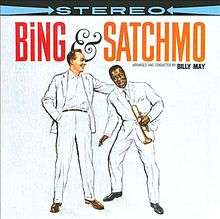Bing & Satchmo
| Bing & Satchmo | |||||
|---|---|---|---|---|---|
 | |||||
| Studio album by Bing Crosby and Louis Armstrong | |||||
| Released | October 1960 | ||||
| Recorded | Hollywood, Los Angeles, June 28–30, 1960[1] | ||||
| Genre | Vocal jazz, Traditional pop music | ||||
| Length | 38:51 | ||||
| Label | MGM - E3882P | ||||
| Producer | Simon Rady | ||||
| Bing Crosby chronology | |||||
| |||||
| Louis Armstrong chronology | |||||
|
|||||
Bing & Satchmo is a 1960 studio album by Bing Crosby and Louis Armstrong, arranged and conducted by Billy May.[2] It was recorded for Crosby's own company, Project Records, and released through MGM. Crosby and Satchmo had worked together many times before they recorded this album, appearing in films such as Pennies from Heaven (1936), Here Comes the Groom (1951) and High Society (1956) together, and making several radio broadcasts between 1949 and 1951.[3] The lyrics of the tunes on Bing & Satchmo were specially adapted for them by a number of notable songwriters.[4]
Only eleven tracks were issued on the original vinyl LP with "(Up A) Lazy River" being held back as it had been previously recorded by Louis Armstrong for another company. Special permission was, however, granted for it to be included in the "All Star Festival" LP issued in 1963 on behalf of the United Nations in aid of the world's refugees.[5] Johnny Mercer sings a few lines with the chorus on this track.
The tracks "Dardanella" and "Muskrat Ramble" from Bing & Satchmo were both released as singles in October 1960. Billboard magazine commented that the tracks would be popular with "jocks".[6]
The entire album, including "(Up A) Lazy River", was issued on CD in 2009 by DRG Records (91515).
Another release of the album was in Australia and New Zealand, by Karussell Records, catalogue K 102 (for Australian release) and M 591 (for New Zealand release). The album was titled 'Bing and Louis', and did not include the two tracks "Bye Bye Blues" or "(Up A) Lazy River".
Reception
| Professional ratings | |
|---|---|
| Review scores | |
| Source | Rating |
| Allmusic | |
The initial Billboard review from 31 October 1960 selected the album for its pop spotlight, and described the album as a "group of nostalgic tunes that provide excellent easy listening programming".[7]
Variety said: “Teamup of Bing Crosby and Louis Armstrong provides a lot of listening pleasure. Both are masters of their craft and know how to pack a vocal punch with seemingly little effort.[8]
John Bush on Allmusic.com gave the album three and half stars out of five. Bush said that "Could anything but warmth and playfulness result when the two most seminal, expressive voices of the 20th century found the room to stretch out on a full LP together?". Bush reserved criticism for the vocal chorus that appears on the album.[2]
Track listing
SIDE ONE
- "Muskrat Ramble" (Kid Ory, Ray Gilbert) – 3:03
- "Sugar (That Sugar Baby O' Mine)" (Maceo Pinkard, Edna Alexander, Sidney D. Mitchell) – 5:13
- "The Preacher" (Horace Silver) – 2:21
- "Dardanella" (Fred Fisher, Felix Bernard, Johnny S. Black) – 2:50
- "Let's Sing Like a Dixieland Band" (Alan Bergman) – 2:21
SIDE TWO
- "Way Down Yonder in New Orleans" (Joe Turner Layton, Henry Creamer) – 3:09
- "Brother Bill" (Silver) – 3:01
- "Little Ol' Tune" (Johnny Mercer) – 3:07
- "At the Jazz Band Ball" (Nick LaRocca, Larry Shields, Johnny Mercer) – 3:02
- "Rocky Mountain Moon" (Mercer) – 3:42
- "Bye Bye Blues" (Fred Hamm, Dave Bennett, Bert Lown, and Chauncey Gray) – 3:48
BONUS TRACK
- "(Up a) Lazy River" (Hoagy Carmichael, Sidney Arodin) – 3:14
Personnel
- Performance
- Bing Crosby (vocals); Louis Armstrong (vocals, trumpet); Billy May (arranger, conductor); Dick Cathcart, Shorty Sherock (trumpets); Abe Lincoln, Tommy Pederson, Moe Schneider (trombones); Matty Matlock (saxophone), Wilbur Schwartz, Chuck Gentry, Justin Gordon (reeds); Stan Wrightsman (piano); George Van Eps (guitar); Morty Corb (double bass); Nick Fatool (drums); Johnny Mercer (special effects, vocals); Jud Conlon (choir contractor, choir director); Gil Mershorn (choir), Bernie Parks, Thomas D. Kenny, Joseph Pryor, Burton A. Dole, Jack Graberman, Paul Ely
- Production
- Simon Rady - (record producer), Wild Bill Thompson (choir arrangement)
Reissue CD
- Will Friedwald - liner notes, Elizabeth Yoon - art direction, design, Anaida Garcia associate producer, Hugh Fordin - reissue producer
External links
References
- ↑ Jos Willems (1 January 2006). All of Me: The Complete Discography of Louis Armstrong. SCARECROW PressINC. pp. 329–. ISBN 978-0-8108-5730-8. Retrieved 18 August 2013.
- 1 2 3 Bing & Satchmo at AllMusic
- ↑ Daniel Stein (3 May 2012). Music Is My Life: Louis Armstrong, Autobiography, and American Jazz. University of Michigan Press. pp. 2–. ISBN 978-0-472-05180-9. Retrieved 18 August 2013.
- ↑ Nielsen Business Media, Inc. (12 October 1959). Billboard. Nielsen Business Media, Inc. pp. 16–. ISSN 0006-2510. Retrieved 18 August 2013.
- ↑ Reynolds, Fred. The Crosby Collection 1926-1977 (Part Four: 1951-1960 ed.). Fred Reynolds. p. 304.
- ↑ Nielsen Business Media, Inc. (24 October 1960). Billboard. Nielsen Business Media, Inc. pp. 51–. ISSN 0006-2510. Retrieved 18 August 2013.
- ↑ Nielsen Business Media, Inc. (31 October 1960). Billboard. Nielsen Business Media, Inc. pp. 43–. ISSN 0006-2510. Retrieved 18 August 2013.
- ↑ "Variety". Variety. November 30, 1960.